The International Studies Association gives scholars global reach
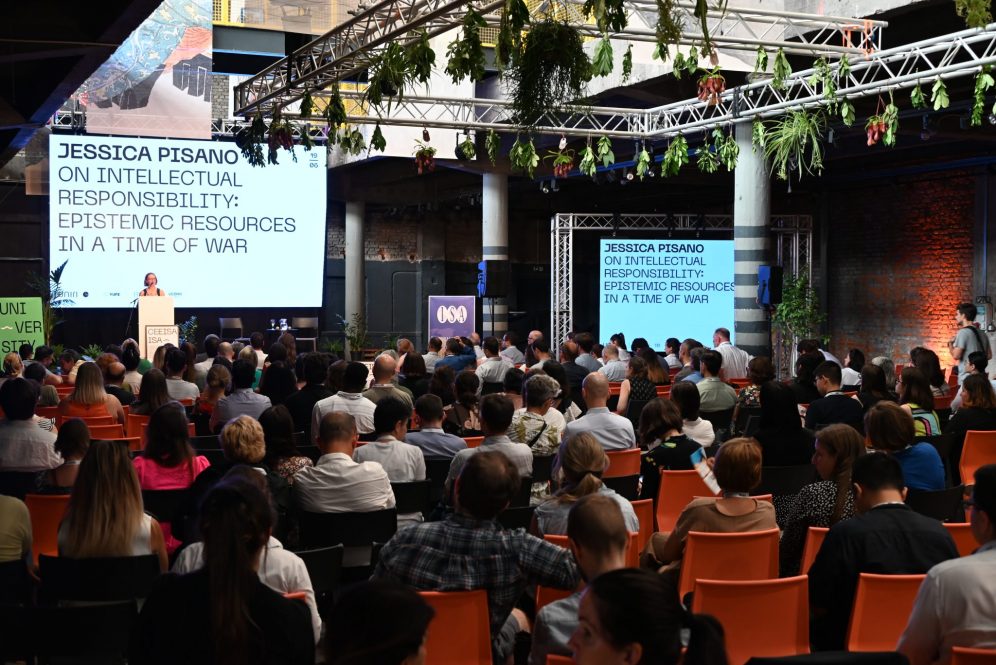
The ISA International Conference 2024, held in June at the University of Rijeka, focused on "Knowing the Global-Local: Imagining Pasts, Debating Futures." (Photo courtesy of UNIRI)
A decade ago, Sercan Canbolat '17 MA '23 Ph.D. was a graduate student in his home country of Turkey. His focus was studying the political psychology of leaders.
What makes them think?
How do they make decisions?
What influences them in their decision making?
His particular focus was on political leaders in the Middle East, where he had grown up and completed his undergraduate degrees.
But as a master's student at Bilkent University in Turkey's capital city of Ankara, he knew first-hand some of the challenges he would face as he tried to present his research to a broader, international audience.
"I'm from Turkey," Canbolat says, "and I know in the broader Middle East and North Africa regions, we don't have a lot of opportunities to get our work published, to present our work to top scholars in the field, and to get good feedback - to learn and acquire the best research skills and presentation skills."
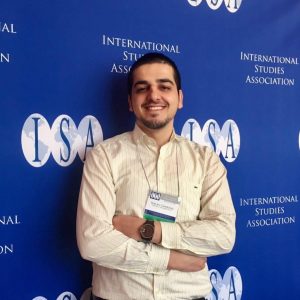
It was during his master's studies that his advisor, Özgür Özdamar, first introduced him to the International Studies Association, or ISA - one of the oldest interdisciplinary organizations dedicated to understanding international, transnational, and global affairs.
"I was writing my MA thesis with him," Canbolat explains, "and he offered for me to write a paper that we could present at ISA. But I couldn't get a visa. So, my advisor went to the conference instead, and he presented our paper."
The following year, though - in 2014 - Canbolat was able to travel to the ISA conference in Toronto, where he put himself in front of a global audience for the first time to present his research.
"I got some feedback from the chair and from the audience, and it was great," he says. "It helped me to build self-confidence, and actually, through ISA, I met many scholars based in the U.S., Canada, and Western Europe. Those connections helped me to apply for and receive a Fulbright scholarship to come to the U.S. for my Ph.D."
That Fulbright Ph.D. grant led Canbolat to UConn in 2014, where he started his doctoral studies in political science.
And in 2015, the organization that helped Canbolat make those connections and first share his research on a global stage - the International Studies Association - also came to UConn.
Best-Kept Secret
Founded in 1959, the ISA has long served as a central hub for the exchange of ideas, for networking, and for programmatic initiatives among those involved in the study, teaching, and practice of international studies.
Through its international and regional conferences and its academic journals, the organization works to promote rigorous discussion, research, and writing on a broad range of topics, including foreign policy, environmental studies, global health, diplomacy, human rights, peace studies, law, and religion.
ISA has been headquartered at UConn since 2015. Under agreements with UConn's Office of Global Affairs, it will remain in residence at UConn until at least 2030.
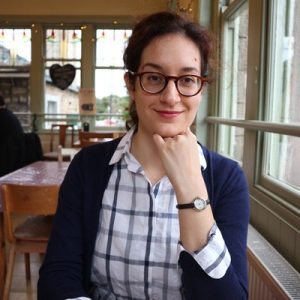
From 2015 to 2024, ISA was under the leadership of Mark Boyer, Board of Trustees Distinguished Professor Emeritus at UConn. As of July 1, 2024, Mike Bosia, professor of political science and international relations and director of gender and sexuality studies at Saint Michael's College, took over the role of ISA's executive director.
"ISA is a hidden gem - one of the best kept secrets at UConn," says Sarah Dorr, the ISA's director of professional development. "We have over 7,000 members in 120 countries."
UConn and ISA are a good fit for each other, says Daniel Weiner, a professor of geography and UConn's vice president for global affairs, because both the organization and the University share similar missions to foster a sense of global-mindedness and facilitate life-transformative educational and research experiences.
"ISA is really a success story about the positive impact of international collaboration," Weiner says. "One of our major goals in Global Affairs is to support interdisciplinary research and engagement on issues of worldwide importance and impact, so partnership with ISA here at UConn is really a natural pairing."
Evolving and Growing
In a complex and ever-changing world, adapting to the needs of the time is important for any organization - ISA included.
"Our organization is constantly evolving and growing," says Dorr, "and we offer different levels of interaction to help people make connections and foster dialogue - something that we feel is particularly critical at this point in time in our increasingly polarized world."
The ISA publishes seven academic journals, co-sponsors an eighth, and partners with Oxford University Press to publish the International Studies Encyclopedia, the most comprehensive reference work of its kind for the fields of international studies and international relations.
The organization has steadily grown its online and social media presence and, in response to the pandemic in 2020, launched a roster of unique virtual programs to broaden its reach to scholars who might not otherwise have the ability to take part in global opportunities.
Not all students and academics have access to the same resources at their institution. ISA's virtual initiative provides these programs to level the playing field and create community whilst doing so. — Sarah Dorr, ISA's director of professional development
"Not all students and academics have access to the same resources at their institution," says Dorr, who curates virtual programming as part of her role at ISA. "ISA's virtual initiative provides these programs to level the playing field and create community whilst doing so. Virtual programming allows people to interact with the association throughout the year, and it widens participation and increases accessibility to ISA's pedagogical and research communities."
ISA's virtual programming is available to all members of the UConn community, regardless of membership. To date in 2024, ISA has produced more than 30 programs, with additional virtual events scheduled for the remainder of the calendar year on topics including banal nationalism, Fulbright scholar opportunities, and the impending results of the 2024 U.S. Presidential Election.
But what ISA has historically been known for are its national and regional conferences - gatherings where scholars from all walks of life and levels of experience come together to share their research, build new networks, and contribute to scholarship on a global level.
An Academic Home
Canbolat's first ISA conference was in Toronto, but in the years since, ISA has taken him to San Francisco, Nashville, Atlanta, and even Hong Kong.
"It was a great experience; my first time in that part of the world," he recalls about the 2017 Hong Kong conference. "It was amazing. I really enjoyed it."
ISA supported Canbolat's travel to its conferences through a grant program that assists junior scholars, senior graduate students, and scholars from low-income countries in attending conferences that would otherwise be out of reach.
"Grad students don't have a great budget to go to conferences, and it's expensive," Canbolat says. "Travel, accommodations - ISA is really great at providing financial help, especially to students and junior scholars. I benefitted a lot from my ISA travel grants. It really helped make it happen, to go and attend the conferences."
While on those trips, Canbolat says he had opportunities to meet eminent scholars in his field, network and build relationships with them, attend panel discussions, and meet and workshop with both journal editors and book publishers.
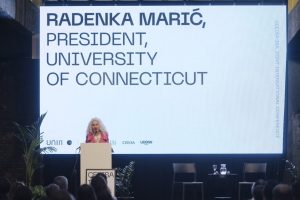
"Even if you don't present, it's still a great experience to go to panels, listen to state-of-the-art research being presented by both prominent scholars and rising scholars," he says. "I've really enjoyed meeting top scholars, prominent scholars, in a personal setting - not in a panel or in a workshop, but at a reception, and to really make personal connections. Tell them about my family. Tell them about my background. Tell them about my plans. And they were very helpful, listening and giving great feedback.
"I think that stands out, meeting those big names. We always read their books, their articles, but it's something else to meet them, especially in a personal setting, a relaxed environment. Having a coffee with them. That stands out," he says.
ISA holds a series of regional conferences throughout each year as well as an annual convention, which will be held in Chicago in 2025.
"One of the major benefits of attending ISA regional conferences is they become a source of intellectual community," says Dorr. "But ISA's annual convention is where people go to find their 'academic home.'"
In June 2024, the ISA built on its long-standing collaboration with the Central and Eastern European International Studies Association, or CEEISA, to host a joint international conference at the University of Rijeka in Croatia.
Focused on "Knowing the Global-Local: Imagining Pasts, Debating Futures," the conference hosted 800 participants - including Weiner and UConn President Radenka Maric - from 65 countries to discuss global and local political science and international relations.
The conference marked the largest gathering of experts in international relations in Croatia to date.
Full Circle
Canbolat wasn't able to travel to Croatia in June, but earlier this year, he attended an ISA conference in San Francisco - to accept the ISA Foreign Policy Analysis Section Best Book Award for 2024.
In 2023, Canbolat and his co-author, Özdamar, published their book, Leaders in the Middle East and North Africa: How Ideology Shapes Foreign Policy, through Cambridge University Press in 2023.
The book is based on the initial research that Canbolat presented at his very first ISA conference in Toronto in 2014.
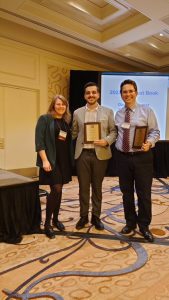
"We published it as a journal article first," he says. "After I presented at ISA, I got feedback. We published it in a good journal. It was well-received, and we got great feedback. And then, we discussed and decided to turn it into a book, into a larger project, and we worked on it for like five, six years. It was a blast, because it kept giving."
Also in 2023, Canbolat completed his Ph.D. at UConn. He's now serving as the inaugural director of Abrahamic Programs at UConn Global Affairs, and he's teaching as a postdoctoral lecturer in the Department of Political Science.
He says he tells all his students about ISA - how it's headquartered at UConn and how they can access the programs and opportunities ISA has to offer.
And he tells other faculty at UConn as well.
"I was surprised that some faculty don't know that ISA is here at UConn," Canbolat says. "I strongly suggest for anyone to try and at least give ISA a shot. Attend one year, and actually, they will be hooked."
To learn more about or connect with the International Studies Association, headquartered at UConn Storrs, visit isanet.org. To stay up-to-date on the latest ISA virtual programs, sign up for ISA Connected at isanet.org/Programs/Virtual-Programs/ISA-Connected.






